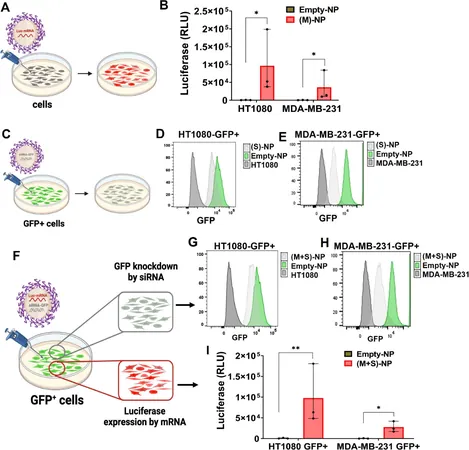
Breakthrough in Therapy: Combining mRNA and RNAi to Fight Cancer and Other Complex Diseases!
2024-12-09
Author: Nur
Introduction
In an exciting development from the University of Ottawa, researchers may have found a revolutionary approach to enhance the treatment of complex conditions such as cancer and cardiovascular diseases.
Their innovative study introduces a dual strategy that harnesses both mRNA and RNA interference (RNAi) therapies, potentially revolutionizing how these diseases are tackled.
The Role of mRNA and RNAi
The phenomenal success of mRNA vaccines during the COVID-19 pandemic has reignited interest in mRNA-based therapies, which adeptly manipulate gene functions.
However, the natural mechanism of RNA interference has long posed a challenge, as it can diminish the beneficial effects of mRNA therapies.
This new research published in ACS Nanoscience Au stands out as a pioneering effort to deliver both mRNA and small interfering RNA (siRNA) together, working in synergy to enhance therapeutic outcomes.
Expert Insights
Dr. Suresh Gadde, co-lead author and Assistant Professor in the Faculty of Medicine, emphasized the major implications this research holds for treating intricate illnesses.
"Our work will have a huge impact on mRNA and RNAi-based therapies and drug development for complex diseases like cancer and cardiovascular diseases," he stated.
Challenges Addressed in Cancer Treatment
When it comes to cancer treatment, challenges such as mutations in tumor suppressor genes, drug resistance, and tumor recurrence complicate effective therapies.
The nanoparticle strategies devised by Dr. Gadde and his team effectively address these significant hurdles all in one treatment.
Promising Frontier of RNA-based Strategies
Utilizing RNA-based strategies represents a promising frontier in tackling critical diseases, yet cancer’s multifaceted nature has traditionally required multi-target approaches.
This groundbreaking research, conducted in both in vitro and in vivo settings, reveals new possibilities for therapy, incorporating methods such as mRNA introduction, RNA interference, and translational modulation.
Innovative Technology for Gene Regulation
Dr. Gadde elaborated, “By utilizing this advanced technology, we can reactivate tumor suppressor gene expressions, such as PTEN and P53, essential for immunotherapy, while simultaneously silencing genes and proteins linked to drug resistance and cancer stem cell development.”
Future Directions
The findings from this study are expected to propel further investigations into creating nanoparticles filled with therapeutic mRNA and siRNA.
Researchers aim to analyze their effects in animal models that are amenable for clinical translation.
Conclusion
“We can strategically enhance or suppress gene interactions to optimize treatment outcomes,” Dr. Gadde added.
“Our approach allows us to promote anti-tumor factors while minimizing those that fuel tumor growth.”
With these pioneering advancements, the path to overcoming complex diseases appears brighter than ever, teasing the prospect of transformative new therapies on the horizon.



 Brasil (PT)
Brasil (PT)
 Canada (EN)
Canada (EN)
 Chile (ES)
Chile (ES)
 España (ES)
España (ES)
 France (FR)
France (FR)
 Hong Kong (EN)
Hong Kong (EN)
 Italia (IT)
Italia (IT)
 日本 (JA)
日本 (JA)
 Magyarország (HU)
Magyarország (HU)
 Norge (NO)
Norge (NO)
 Polska (PL)
Polska (PL)
 Schweiz (DE)
Schweiz (DE)
 Singapore (EN)
Singapore (EN)
 Sverige (SV)
Sverige (SV)
 Suomi (FI)
Suomi (FI)
 Türkiye (TR)
Türkiye (TR)